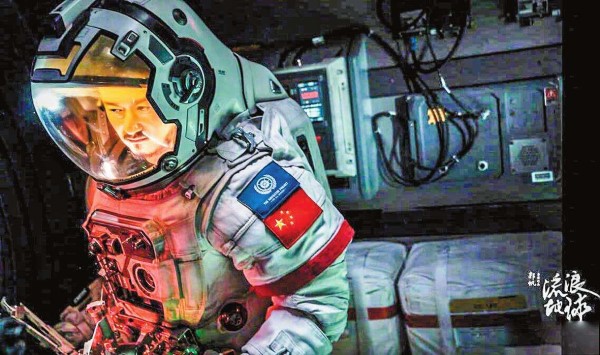


Official poster of The Wandering Earth
The first domestic sci-fi epic, The Wandering Earth, a movie based on a Hugo Award novel, is scheduled to hit the big screen in China during the Spring Festival, amid the nation’s rising curiosity about the universe.
The movie is adapted from a short novel by Liu Cixin, China’s first Huge Award winner—a top honor for international sci-fi writers. The story is set in a doomed future where the Sun is about to explode and tells the story of Chinese astronauts who try to save humanity.
Actually, China produced lots of sci-fi writings and movies since the early 1960s, but it was not until reform and opening-up that Chinese directors and screenwriters began to take advantage of the rapidly changing society.
In 1990, the movie The Ozone Layer Vanishes made many audiences ponder the future of Earth, as it told a story of a toxic gas container that was hijacked, which then threated ozone layer and thus the existence of human beings.
However, many see the upcoming movie The Wandering Earth as a symbol of the real beginning of China’s sci-fi movie development.
“This movie is the start of China’s sci-fi movies,” commented Liu Cixin, adding that the cost of sci-fi movies in China has been relatively low and the movie settings have been relatively simple. The Wandering Earth marks the first major blockbuster sci-fi movie, providing a good start for the development of China’s future sci-fi movies.
Meanwhile, Liu also pointed out that the rise of China’s sci-fi movies came as part of the result of its rising national strength and significant improvement in science and technology.
Specifically, the country’s scientific breakthroughs in space—from the alien-hunting FAST (Five-hundred-meter Aperture Spherical radio Telescope) to the Yutu-2 lunar rover that landed on the far side of the moon for the first time in history—have inspired the public’s curiosity about the universe.
A survey by the China Research Institute of Science Popularization released in September last year showed that most Chinese are getting their science news or knowledge through television and online platforms, reaching 68.5 percent and 64.6 percent, respectively. The proportion of science-literate Chinese citizens has increased to 8.47 percent in 2018, up 2.27 percentage points from three years ago, the Global Times reported.
 Fire brigade in Shanghai holds group wedding
Fire brigade in Shanghai holds group wedding Tourists enjoy ice sculptures in Datan Town, north China
Tourists enjoy ice sculptures in Datan Town, north China Sunset scenery of Dayan Pagoda in Xi'an
Sunset scenery of Dayan Pagoda in Xi'an Tourists have fun at scenic spot in Nanlong Town, NW China
Tourists have fun at scenic spot in Nanlong Town, NW China Harbin attracts tourists by making best use of ice in winter
Harbin attracts tourists by making best use of ice in winter In pics: FIS Alpine Ski Women's World Cup Slalom
In pics: FIS Alpine Ski Women's World Cup Slalom Black-necked cranes rest at reservoir in Lhunzhub County, Lhasa
Black-necked cranes rest at reservoir in Lhunzhub County, Lhasa China's FAST telescope will be available to foreign scientists in April
China's FAST telescope will be available to foreign scientists in April "She power" plays indispensable role in poverty alleviation
"She power" plays indispensable role in poverty alleviation Top 10 world news events of People's Daily in 2020
Top 10 world news events of People's Daily in 2020 Top 10 China news events of People's Daily in 2020
Top 10 China news events of People's Daily in 2020 Top 10 media buzzwords of 2020
Top 10 media buzzwords of 2020 Year-ender:10 major tourism stories of 2020
Year-ender:10 major tourism stories of 2020 No interference in Venezuelan issues
No interference in Venezuelan issues
 Biz prepares for trade spat
Biz prepares for trade spat
 Broadcasting Continent
Broadcasting Continent Australia wins Chinese CEOs as US loses
Australia wins Chinese CEOs as US loses